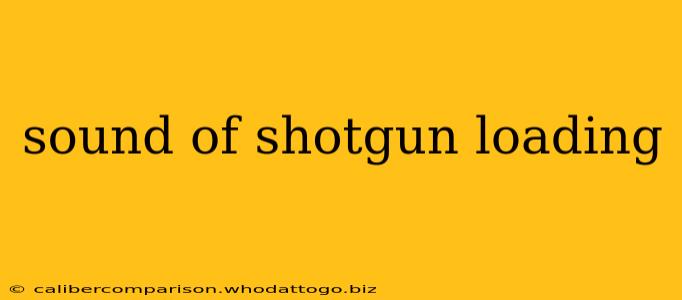The distinctive thunk or clunk of a shotgun loading is instantly recognizable to anyone familiar with firearms. But what exactly creates this sound, and why does it vary between different shotguns? This article delves into the mechanics of shotgun loading, exploring the physics and acoustics that contribute to this characteristic auditory signature.
Understanding the Loading Mechanism
Before we dissect the sound, let's understand the process. Loading a shotgun involves inserting a shell—a self-contained unit containing the gunpowder, primer, and shot—into the shotgun's chamber. This is typically accomplished through one of two main mechanisms:
1. Break-Action Shotguns:
Break-action shotguns require manually opening the action (breaking the gun open) to access the chamber. The shell is then inserted, and the action is closed. The sound here is primarily generated by:
- The metallic clunk: This comes from the forceful engagement of the breech face against the shell's base, locking the action closed. The precise sound varies depending on the metal used (steel, aluminum alloys), the tolerance of the mechanism, and the force applied. A tighter fit typically results in a sharper, more solid clunk.
- Shell interaction: The shell itself may also make a slight scraping or rattling sound as it's inserted and seated.
2. Pump-Action and Semi-Automatic Shotguns:
These shotguns use a sliding forearm (pump-action) or recoil-operated mechanisms (semi-automatic) to load the next shell from the magazine tube. The sounds here are more complex and include:
- The thunk of the shell dropping: Gravity and the shell's own weight contribute to the sound as it falls into the chamber. The sound's character is influenced by the geometry of the magazine tube and how smoothly the shell feeds.
- The shuck or click of the action: This is the sound of the action cycling—the bolt moving forward, stripping a shell from the magazine, and chambering it. The sounds are often related to the interaction of the moving parts. This is frequently the loudest part of the loading process in this type of shotgun.
- The final click or thunk of the bolt locking: Similar to the break-action, a final locking sound indicates the shell is securely chambered.
Factors Influencing the Sound
Several factors beyond the basic loading mechanism affect the sound of a shotgun loading:
- Shell type and condition: The type of shell (e.g., plastic, paper) and its condition (e.g., new, slightly damaged) affect the sound of its insertion and interaction with the mechanical parts.
- Shotgun condition and maintenance: A well-maintained shotgun will generally have a cleaner, more precise sound compared to one that's worn or dirty.
- Surrounding environment: The acoustics of the environment play a role. A sound might be muffled in a dense forest versus clear in an open field.
The Importance of the Sound
While seemingly insignificant, the sound of a shotgun loading can be crucial in various contexts:
- Safety: The characteristic sound acts as auditory feedback, confirming the loading process. A lack of a clear, distinct sound might signal a malfunction.
- Hunting and tactical situations: The sound can be a tactical consideration, alerting others to the loading process or potentially compromising a hunter's position.
- Film and media: Sound designers often carefully replicate the sound of shotgun loading for a realistic portrayal in movies, games, and other media.
Conclusion
The seemingly simple act of loading a shotgun involves a complex interplay of mechanics and acoustics. Understanding the factors that influence the distinct sound provides insight into the firearm's functionality, maintenance, and even its role in various situations. From the crisp clunk of a break-action to the rhythmic shuck of a pump-action, the sound of a shotgun loading is more than just a noise—it's a signature of mechanical precision and a critical part of safe and effective firearm handling.

